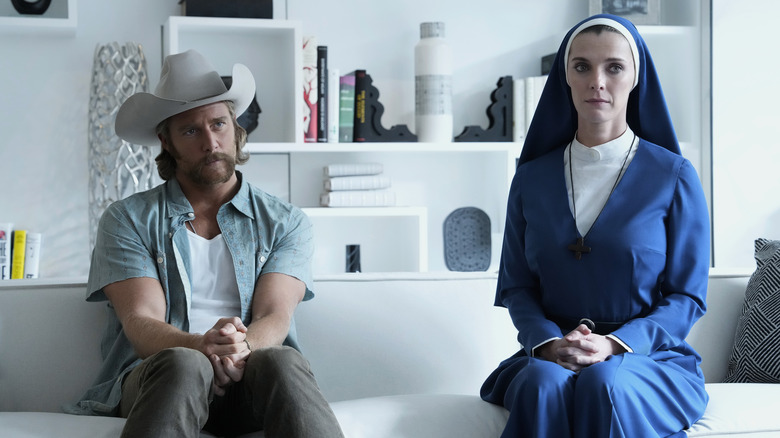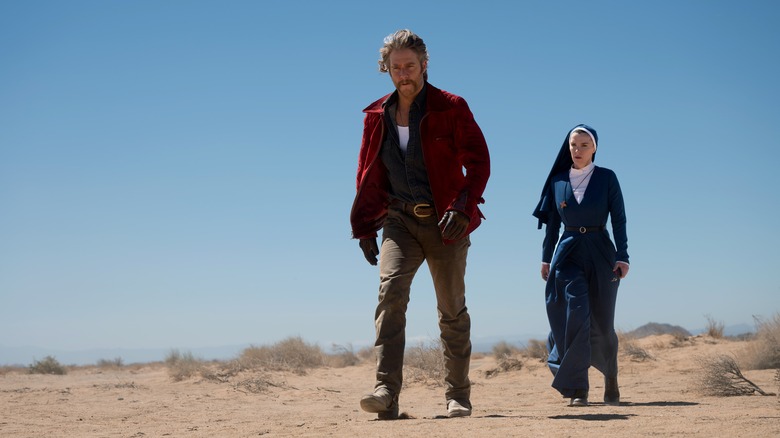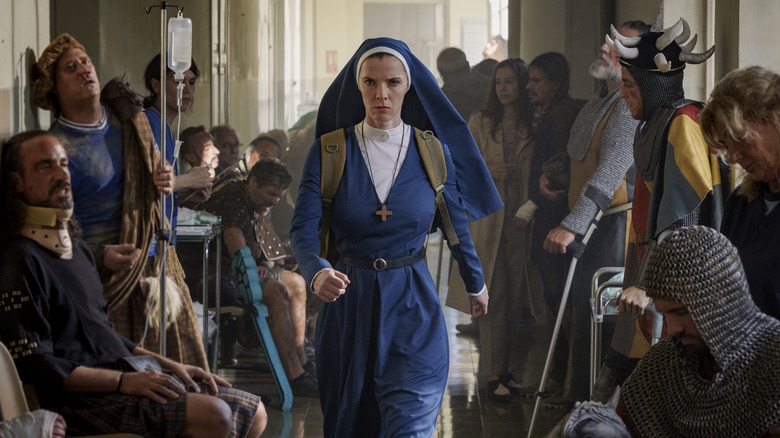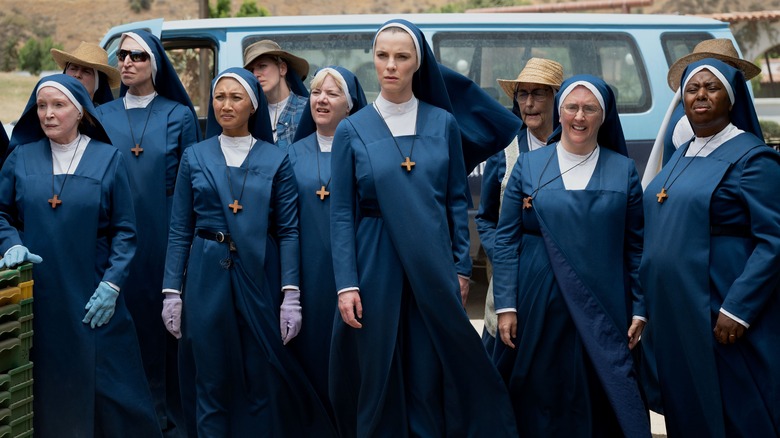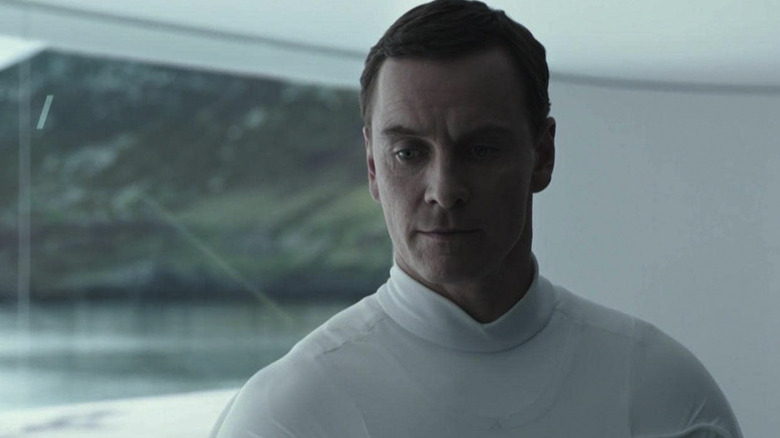Damon Lindelof On Mrs. Davis, The State Of Streaming, And More [Exclusive Interview]
There are few people who have influenced TV quite as much over the last 20 years as Damon Lindelof. From co-creating "Lost" and helping usher in the latest Golden Age of Television to pulling off the absolute miracle that is "Watchmen," the man has had his hand in a lot of important stuff, to say the very least of it. And that's not even mentioning his work on huge movies such as "Prometheus" and "Star Trek: Into Darkness." Now, Lindelof is back with a new small screen adventure, this time for Peacock, in the form of the genre-bending series "Mrs. Davis."
"Mrs. Davis" recently held its premiere at SXSW and the marketing leading up to that premiere has been very mysterious. We know Betty Gilpin ("The Hunt") is in the lead role, but what else do we really know? The show focuses on the world's most powerful Artificial Intelligence and a nun named Simone who is devoted to destroying Her. Though, as anyone who has seen Lindelof's work in the past knows, it's not so simple as all of that. Lindelof co-created the show alongside Tara Hernandez ("Young Sheldon"), and from what I've seen, it's sure to inspire a great deal of conversation.
In honor of "Mrs. Davis" holding its premiere, I had the good fortune of speaking with Lindelof not only about his new show, but his impressive career in general. We discussed what's changed with TV since "Lost" premiered nearly 20 years ago, the state of streaming, his approach to the "Star Wars" movie he's working on, and so much more.
Note: This interview has been lightly edited for clarity and brevity.
'That show couldn't have existed in 2004'
I had this realization when I was watching the first episode of "Mrs. Davis" last night, it's been almost 20 years since "Lost." You're doing "Mrs. Davis" now for Peacock. What is the radical difference between when you started "Lost" and now starting this? What have you noticed in the two decades between launching a show then and launching a show now?
Oh my god, that's a great question. I will say that the fundamental difference appears to be that so much more thought and intention goes into the creation and design of a show before you start writing it now than it existed then. I mean, in 2004, basically the only way that a show basically came into existence was that there was this very narrow window that kind of took place between maybe October and January where you would pitch television show ideas. If they liked it, they would commission an outline in a pilot, and then by the end of January, they'd pick the pilots they wanted to make and then they went into production and then that was it.
Now, basically you can spend six months, a year, conceiving out an entire season — if not series of television. In mine and Tara's case, we wrote the pilot on spec. We built an entire deck sort of around, "Here's what the journey of the entire show is, this is what the finale of season 1 might be, these are potential future seasons," etc. Those conversations not only didn't happen on "Lost," but all your energy went into making this one thing, and if it went, then you sort of figured it out from there. I also think that the commercial considerations that existed in 2004, it was a zero-sum game. You had to get 8 to 10 million eyeballs on your show on the night that it aired, or it wasn't going to make it past six episodes. Now, I guess the number is closer to like 1 million eyeballs.
Imagine if you got eight million on the first episode of this. They would be hosing you down in champagne.
Yes. Now it's like, "How many eyeballs over time?", but also, "Does it crack the culture?" So "White Lotus" season 1 probably didn't have eight million eyeballs, but people on the coasts were talking about it and it became a thing. Then it starts to build awareness and excitement so that by the time "The White Lotus" season 2 comes along, now you're starting to generate eyeballs. But "The Leftovers" was able to exist with no eyeballs almost the entire time it was on because it was checking whatever cultural boxes HBO needed it to check. But that show couldn't have existed in 2004.
Streaming and premium cable metrics fascinate me, because I'm a box office guy and I can look at these numbers, and the numbers don't lie. Streaming fascinates me because I look at it and I don't know how these decisions get made sometimes. It's just crazy.
And it's a black box. I do think the numbers — the idea of what's the more valuable number? How many people watched an episode of "Stranger Things" or how many people watched all episodes of "Stranger Things?" Or are they watching it? Is there a valuation put on, they watch an entire season of "Stranger Things" over the course of four to eight hours, or is the higher value player in someone who watches it over the course of three weeks? Which would make sense because the more time they spend on Netflix — ultimately, you want to make content that rabbit holes your subscribers into other content.
Right, because it's ultimately just trying to make sure that they're spending enough time to create value.
Also, how much can I learn about Ryan while he's watching these shows? That's probably the scariest part to me about it, is based on where I pause, if I rewind stuff or if I watch something, again, the algorithm that is making determinations about what I like, and that scares me.
'The violence is excessive, it's over the top. It's meant to be sort of off-putting'
So let's circle back to "Mrs. Davis." I think what struck me the most, and I didn't really know what to expect watching it, was it is so violent.
Oh, yes.
You talked about network TV. I don't know if any of that would've even come close to flying, but did you guys have any pushback at all on that from Peacock?
For that opening sequence, the grail opening — which, all I can say without spoiling anything is it's not what it appears to be — in the script, it says that the violence is excessive, it's over the top. It's meant to be sort of off-putting. I think we're signaling a couple of things there. The first is that when people are watching a show, you do want to signal early on, "Here's what we're going for." It's like, is the violence just gore for gore's sake? Or is there a slightly absurdist — like if someone's jumping through the air with like a sword through their body?
I was literally just about to bring that up to you. I watch a lot of action cinema, that was one of the most inventive kills I've ever seen in my life. Incredible.
Fantastic. Tara and I spend a disproportionate amount of time talking about "John Wick" movies and "Fast and Furious" movies. "Fast and Furious" is not supernatural, but it is supernatural.
It obeys the laws of the universe they've set up.
Which is not the universe that you and I live in.
It's a universe where a 150 mile plane runway can exist and you believe that exists.
The tonality we were going for was heightened, whereas other stuff that I've worked on goes for diminished, like "The Leftovers," the entire vibe and the entire energy of it was a much lower-key presentation.
Even "Watchmen," for a superhero show.
Yes, correct. There's moments that you build to. But this, it kind of was like, "All right, we want to adrenalize things coming right out of the gate." Also the idea of, our hero actually isn't going to walk on the stage until you've been living in this thing for 10 or 12 minutes or whatever it is. So all those decisions can be traditional barriers for entry, back to your original [question]. We never would've gotten away with that in 2004, let alone 2010 or maybe even 2020 on a broadcast network. But I do think that the idea of, maybe we have a little bit more — like the judge saying, "I'll allow it, but careful, counselor." [laughs]
'If no one wants to watch these things, then they cease to exist'
So I talked to Tara about this, too, but we've seen recently the impermanence of streaming. Stuff is leaving streaming services and it's available nowhere. How do you feel about that as a TV creator now? You made this TV show for a streaming service. Do you have any concern that this is just going to go away at some point? Or are you just praying that everything gets a physical release now?
I'm confused about it. I think at the end of the day, as much as we don't want to acknowledge the obvious, if no one wants to watch these things, then they cease to exist. So it's like if you write a book that nobody wants to read, it's very hard to find in the bookstore. If you write a book that everybody wants to read, it's there in the standee. I think that ultimately, we're migrating towards — you're an industry professional; I could name ten TV shows and you could probably tell me what platforms they exist on. But most people that I know, particularly my parents or even friends that I have who are outside the business, I'll be like, "Watch 'Severance.' It's on Apple [TV+]." And they'll be like, "How do I watch that?" They know that the "Star Wars" shows are on Disney+ and the Marvel shows are on Disney+, and that "Stranger Things" is on Netflix. Or maybe "The Last of Us" is on HBO.
Yeah. But that's the gift of branding for those. That's like the pillars for those streaming services. But then everything else...
Right, so it's like, I've got a new show coming on. It's on Peacock. They're like, "Oh, hey, is that NBC?" No, that's not NBC. "So is it going to be on NBC?" No, it's just on Peacock. "Why can't it be on NBC?" Well, the content. There's cursing, and there's violence, and also they're trying to be exclusive. It's like "Poker Face." "What's that?" I'm like, "Ugh, I thought everybody knew about 'Poker Face.'"
Yeah, it was already hard not to be able to talk about TV because everyone's watching things at different clips now. And yet you're right.
But the branding becomes irrelevant. All that matters is the show. "Twin Peaks: The Return" was on Showtime. [The original] lived on ABC. "Westworld" has now left HBO Max, and it's going to be on some FAST [free ad-supported] streamer.
Roku, I think.
Yeah, but all that matters is that "Westworld" still presents as a prestige, high-budget [show]. It still looks different than "The Expanse." That isn't bad, I love "The Expanse." It's just all that matters is the content. Where it lives, and how people access it, is anyone's guess. I just want people who want to see the show to be able to watch it without spending an arm and a leg.
I know you're not going to be able to say anything about it, but I always say that "Star Wars" is as close as I get to religion. I don't have memories that go back further than "Star Wars." I'm not going to ask you about what your movie is about. But what is it like getting to craft something in that galaxy, particularly as you're not beholden to the Skywalker saga right now. What is that like?
I will just say that for reasons that I can't get into on this Sunday morning, on this day, the degree of difficulty is extremely, extremely, extremely high. If it can't be great, it shouldn't exist. That's all I'll say, because I have the same association with it as you do, which is, it's the first movie I saw sitting in my dad's lap, four years old, May of '77. I think it's possible that sometimes when you hold something in such high reverence and esteem, you start to get in the kitchen and you just go, "Maybe I shouldn't be cooking. Maybe I should just be eating." We'll just leave it at that point.
I think you had said something similar before "Watchmen," and you absolutely pulled that off.
By the hair of my chinny-chin-chin.
'If you're obsessed with David, why don't you just do another Blade Runner?'
I am also a massive "Alien" guy. I love "Alien: Covenant," which sort of brought me around on "Prometheus." If I'm not mistaken, you were going to write something that more resembled "Prometheus 2" at one point rather than what became "Alien: Covenant." That was such a fascinating thing, particularly now that we are never going to get to see the final entry in that trilogy.
I would say that basically, for the year I spent with Ridley [Scott] while we were developing what eventually became "Prometheus," he was very interested in multiple ideas that felt like they would be kind of like "Prometheus 2"s. But then I think by the time that script existed and the movie was in production, he was really fascinated by David and particularly [Michael] Fassbender, all of that stuff was happening. And around that time, "The Leftovers" and I think "Tomorrowland" were both kind of on my horizon. There was never any active conversation about me writing another movie beyond "Prometheus." But Ridley was also talking about doing another "Blade Runner" movie at the time, as well. He was just very, very interested in machine intelligence and androids. I was like, "If you're obsessed with David, why don't you just do another 'Blade Runner?'" But I love ["Blade Runner 2049"] as well. But I think "Covenant" is great, too.
I think that's another one of those movies that I feel like time is going to be kind to.
Absolutely.
I was really frustrated with the response to that one at the time.
It's an enduring franchise where we want them to play the hits, but we also want to introduce new ideas. I think that the idea of how much can the "Alien" franchise hold hard sci-fi, how much of it needs to be horror-driven — I'm really curious to see what Noah [Hawley's] ["Alien"] show on FX is going to be, because I know he's ride or die "Alien." So it's going to be great.
"Mrs. Davis" premieres April 20, 2023 on Peacock.
